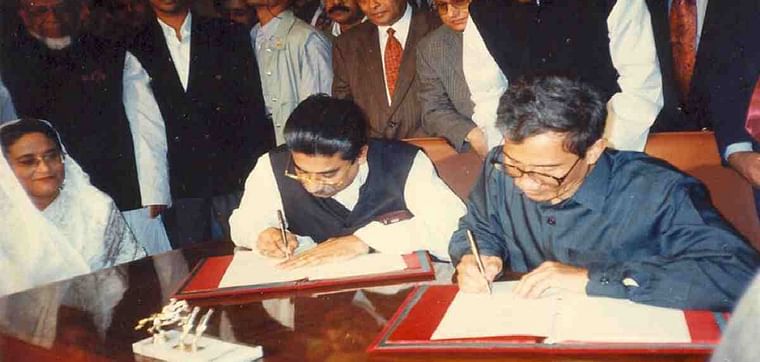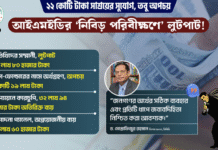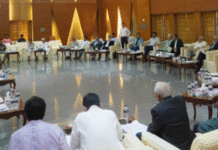
The signing of a peace deal between PCJSS and then Awami League government in 1997 did not mean anything only for the Chittagong region. It was, in fact, more than that.
Twenty-three years have elapsed since the signing of the Chittagong Hill Tracts (CHT) Peace Accord, but some conditions of the historic treaty still remain unfulfilled due to “non-cooperation from some armed groups.”
Locals and officials say these groups are trying to destabilise peace in the three hill districts again.
The main objective of the historic treaty was to establish peach in the hilly region and ensure the country’s progress.
But, they said, peace has not fully returned in the region over the last two decades as the armed groups remained engaged in various terrorist activities, including murder, kidnapping and extortion.
But it cannot be properly implemented due to the opposition by the anti-peace treaty groups, the officials said.
On 2 December 1997, PCJSS (Parbatya Chattagram Jana Sanghati Samity) signed the peace deal with then Awami League government, led by Sheikh Hasina, ending over two decades of ethnic minority groups’ insurgency and bloodletting in the hill districts.
Then parliament chief whip Abul Hasnat Abdullah signed the deal on behalf of the government while Jyotirindra Bodhipriyo Larma (Santu Larma) on behalf of PCJSS.
But a group of ethnic minority people, led by Prasit Bikash Khisa, formed the United People’s Democratic Front (UPDF) in 1998 opposing the peace treaty.
PCJSS also faced a split as some of its members quit it in 2007 and formed PCJSS (Reformists) led by Sudha Sindho Khisa.
UPDF’s another armed group also formed a separate platform the UPDF (Democratic), led by Tapan Jyoti Chakma (alias Borma and Jalwa) on 15 November 2017.
Extortion & Killing
These groups have reportedly been engaged in various crimes, including extortion, kidnapping and killing, locals alleged.
They said sometimes they clash with each claiming the lives of both ethnic minors and Bengali-speaking people and hampering development activities.
According to the law enforcement agencies, the four hilly armed groups have been at loggerheads just for establishing supremacy and extortion.
They said though there is no specific study, law enforcers, local police and intelligence agencies said around Tk 4 billion is extorted in the CHT region every year.
They said the local armed groups are constantly changing their tactics in the case of extortion.
“They’ve chosen mobile banking as the way of collecting toll to dodge the eyes of security forces. So, it’s now difficult to identify them. Those who pay the toll money also don’t want to speak up about the extortion in fear of reprisal,” an officer of a leading Intelligence agency in Rangamati district told news agency UNB wishing anonymity.
He said the negative attitude of the JSS is the main barrier towards full implementation of the peace accord. “Armed groups must surrender the illegal arms to pave the way for the smooth implementation of the peace accord.”
He said the armed groups are now targeting the Awami League leaders and activists in the hilly districts as part of their move to destabilise the region.
“Maintaining a hostile relation with Awami League leaders and activists, it’s not possible to bring peace in CHT,” Dipankar added.
He said JSS should come forward with a positive mentality to restore peace in the CHT. “Otherwise, all efforts will go in vain.”
According to official statistics, 376 people, including 120 Bengali-speaking people, have been killed in three districts of the CHT in various incidents like extortion and conflict over supremacy from January 2014 to October this year.
Besides, 536 people, including 169 Bangalis, have been abducted during the period.
Sources at the local police and intelligence agencies said 105 extortionists in the Chittagong Hill Tracts have been detained by law enforcers since January 2019 to September 2020.
Locals said they have to pay a certain amount of money to the armed groups for whatever is sold in markets.
“Even if you sell a banana, you’ll have to pay a portion of the money to the armed groups from there,” said a resident of Rangamti town.
Hazards in dealing with crimes
Talking to UNB, Superintendent of Police (SP) of Rangamati Alamgir Kabir, said there are some obstacles to the prompt arrest of accused and put them on trial in murder cases due to geographic location of Chittagong Hill Tracts and some other reasons.
“Once a crime is committed in a remote area, it’s difficult to find an eyewitness. In many cases, it takes three days to come from a remote area to testify. They don’t want to do that. Linguistic problem is also a barrier to any investigation and finding out offenders as the different communities use different colloquial.”
“Army, police and BGB personnel usually jointly conduct operations and we take instant action if we get any information about extortion. That’s why they’re constantly changing the strategy of extortion,” Kabir said.
He said the criminals now receive toll money through mobile banking instead of collecting it physically. “So, we now try to take action through tracking.”
Obstruction to development
A senior officer in the Rangamati district administration said ethnic minority leaders and armed groups have been directly and indirectly opposing the development of the region and tourism industry in the CHT only to exploit the residents of the region and maintain their supremacy.
He said the members of JSS (original) and UPDF keep on carrying out various criminal activities, including making attacks on tourist vehicles and hijacking to create obstacles to development of the tourism industry in the region and discourage the arrival of tourists.









